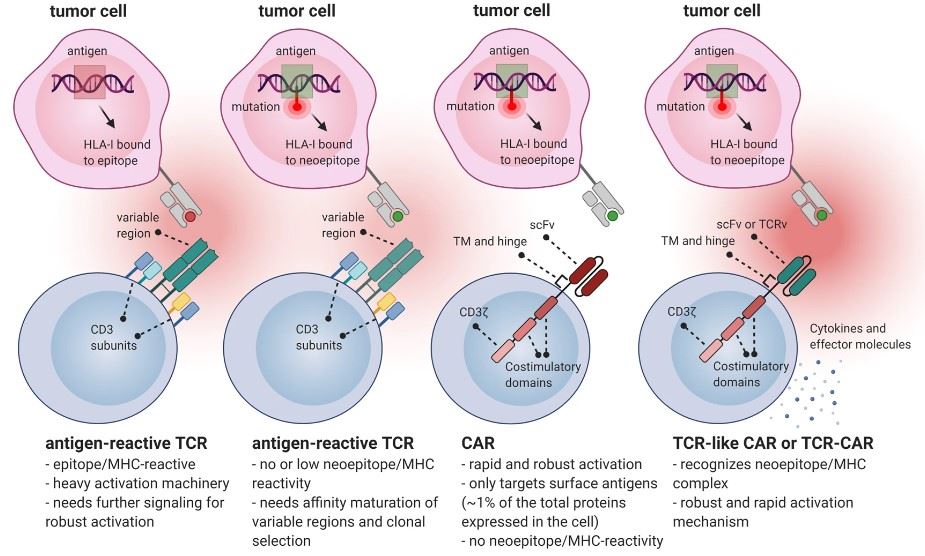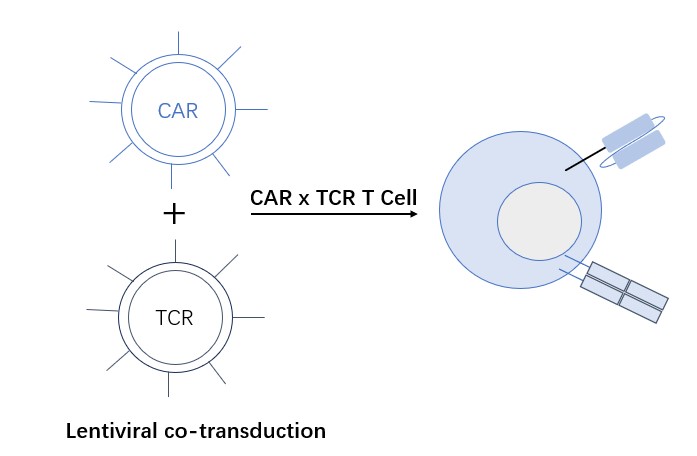The conventional CAR-T cells are adept at targeting cell surface antigens, but their ability is restricted to about 1% of the proteome. Conversely, T cell receptors (TCRs) can recognize a broader array of intracellular proteins presented on major histocompatibility complex (MHC) molecules, but their effectiveness can be compromised due to competition for signaling domains within T cells. To circumvent these limitations, Creative Biolabs has pioneered the CellRapeutics™ CAR × TCR Bispecific T Cells Engineering Platform, combining the strengths of CAR and TCR technologies for a dual-targeting approach aimed at improving therapeutic outcomes.
 Fig.1 Schematic diagram of conventional TCR or CAR recognition antigen epitopes.1
Fig.1 Schematic diagram of conventional TCR or CAR recognition antigen epitopes.1
Creative Biolabs's pioneering work in the development of CAR × TCR bispecific T cells is anchored in our state-of-the-art CellRapeutics™ platform, which offers a robust and efficient system for engineering these advanced cellular therapies. The innovative CAR × TCR bispecific T cells leverage the unique abilities of both CARs and TCRs to maximize anti-tumor efficacy. CARs provide MHC-independent targeting of cell surface antigens through high-affinity scFvs, while TCRs enable the recognition of peptides derived from cellular protein degradation, expanding the target antigen repertoire to include neoantigens and other intracellular epitopes.
 Fig.2 Schematic diagram of CAR x TCR Bispecific T Cells.
Fig.2 Schematic diagram of CAR x TCR Bispecific T Cells.
Our platform employs high-capacity viral vectors and innovative gene-transfer technologies to achieve efficient co-transduction of T cells with CAR and TCR constructs. We have optimized protocols to ensure high transduction efficiency and expression levels, critical for the effective function of CAR × TCR -T cells.
At Creative Biolabs, we conduct rigorous preclinical testing to validate the functionality of our CAR × TCR bispecific T cells. This includes both in vitro cytotoxicity assays and in vivo efficacy studies using xenograft models.
Recognizing the personalized nature of cancer therapy, our platform is designed to be flexible and adaptable. We tailor our CAR × TCR constructs to target specific antigens or neoantigens based on the patient's tumor profile, ensuring a personalized and effective treatment approach.
Leverage the unique abilities of both CARs and TCRs, CAR × TCR bispecific T cells maximize anti-tumor efficacy.
Targeting neoantigens specific to tumor cells significantly reduces the risk of damaging healthy tissues.
CAR × TCR bispecific T cells benefit from simultaneous signaling through both CAR and TCR pathways, along with enhanced immune synapse formation, T cell activation, and proximal signaling, taking full advantage of T-cell-mediated cytotoxicity to promote effective anti-tumor responses.
Q1: What makes CAR × TCR bispecific T cells superior to traditional CAR-T or TCR-T cells?
A1: CAR × TCR bispecific T cells combine the advantages of both CARs and TCRs, providing a broader range of target antigens and enhanced anti-tumor efficacy. This dual-targeting approach reduces the risk of tumor escape and relapse, offering a more robust therapeutic option.
Q2: How does Creative Biolabs ensure the safety of CAR × TCR bispecific T cells?
A2: Safety is paramount at Creative Biolabs. By targeting tumor-specific antigens and neoantigens, we minimize the risk of on-target off-tumor toxicity. Our advanced gene-transfer technologies ensure precise engineering, and rigorous preclinical testing verifies the specificity and safety of our CAR × TCR constructs.
Q3: What are the clinical applications of CAR × TCR bispecific T cells?
A3: While primarily developed for AML, the versatility of CAR × TCR bispecific T cells makes them suitable for a wide range of malignancies. Ongoing research and clinical trials aim to expand their use to other cancers, potentially revolutionizing the landscape of cancer immunotherapy.
Creative Biolabs is at the forefront of developing innovative cellular therapies designed to meet the most challenging clinical needs. Our CellRapeutics™ CAR × TCR bispecific T cells engineering platform embodies our commitment to delivering cutting-edge, effective, and safe cell therapy development strategies for customers worldwide.
Reference
For any technical issues or product/service related questions, please leave your information below. Our team will contact you soon.
All products and services are For Research Use Only and CANNOT be used in the treatment or diagnosis of disease.
 NEWSLETTER
NEWSLETTER
The latest newsletter to introduce the latest breaking information, our site updates, field and other scientific news, important events, and insights from industry leaders
LEARN MORE NEWSLETTER NEW SOLUTION
NEW SOLUTION
CellRapeutics™ In Vivo Cell Engineering: One-stop in vivo T/B/NK cell and macrophage engineering services covering vectors construction to function verification.
LEARN MORE SOLUTION NOVEL TECHNOLOGY
NOVEL TECHNOLOGY
Silence™ CAR-T Cell: A novel platform to enhance CAR-T cell immunotherapy by combining RNAi technology to suppress genes that may impede CAR functionality.
LEARN MORE NOVEL TECHNOLOGY NEW SOLUTION
NEW SOLUTION
Canine CAR-T Therapy Development: From early target discovery, CAR design and construction, cell culture, and transfection, to in vitro and in vivo function validation.
LEARN MORE SOLUTION